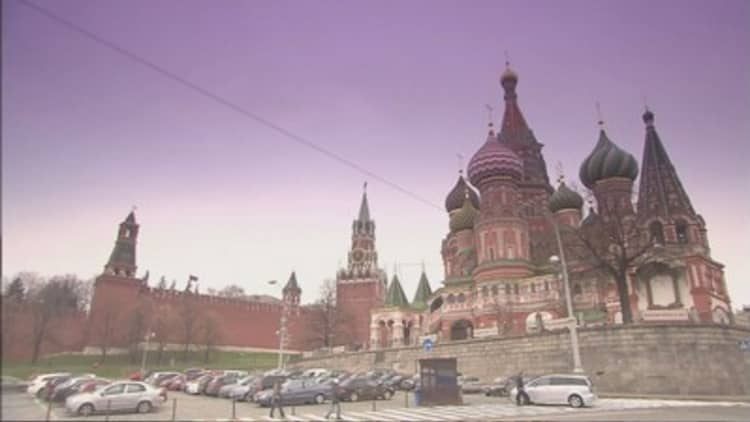
Following worldwide shock over allegations of state-sponsored athletics doping this week, CNBC breaks down what Russia's scandal means for its reputation and the world of track and field sports.
What is Russia accused of?
On November 9, an independent commission set up by the World Anti-Doping Agency (WADA) confirmed widespread use of performance enhancing drugs and blood doping by Russian track and field athletes, which were encouraged and covered-up by coaches, doctors, and state and sports officials.
The 323 page report is the result of a near year-long investigation into the Russian athletics industry. It was launched shortly after the December 2014 release of "Top Secret Doping: How Russia makes its winners," a German documentary that made similar allegations that were later verified through audio, video, interviews and witness testimonies by the commission.
Now, Montreal-based WADA says there is proof of a deep-rooted, long-standing and state-sponsored "culture of cheating," which fueled a widespread conspiracy to cover up athletics doping. It implicates the Russian Ministry of Sport, and organizations including the All-Russian Athletics Federation (ARAF) and the Russia's National Anti-Doping Agency (RUSADA).
And while many athletes were reportedly willing to take part, those who refused were often barred from national teams.
The report also found that over 1,400 lab samples were intentionally destroyed by officials in a Moscow laboratory after WADA asked for their preservation, and uncovered evidence showing that its director was taking cash to delay or taint doping tests.
WADA alluded to top-level bribery in Russian sport, but has delayed releasing that information to the public until Interpol – the International Criminal Police Organization - can conduct its own criminal investigation.
Could other countries be implicated?
"Russia is not the only country, nor athletics the only sport, facing the problem of orchestrated doping in sport," the report explains.
So why single the country out, while other athletes, coaches or perhaps even governments involved in similar schemes around the world go unpunished?
Simply put, it wasn't part of the investigators' mandate. Nor were a wider range of sports, outside of athletics — particularly track and field — considered.
"While there are reliable indications that sports in Russia, other than athletics, are affected by doping, the (independent commission) considered this to be outside its terms of reference," the report stated.
How has Russia reacted?
During the investigation, the head of Russia's athletics federation tried to bar investigators from speaking to athletes, according to the report. It also states that many of the athletes and their coaches themselves refused to participate.
Russian officials openly denied the allegations since the report was released, with President Vladimir Putin calling them "groundless" until concrete evidence is presented.
Meanwhile, the head of Russia's athletics federation Vadim Zelichenok told reporters that WADA's claims bore the marks of a "political hit job," denying claims of widespread corruption.
And under the looming threat of being banned from the Rio Olympic Games in 2016, Russia's Sports Minister Vitaly Mutko said a ban would only be motivated by the need to tarnish Russia's image and remove a powerful competitor.
However, Mutko later told Russian wire agency Interfax that he had extended a hand to WADA, expressing willingness to work on a "road map" that would address doping allegations and ultimately make peace.
But now Putin says the country will need to launch its own internal investigation, saying someone will have to claim personal responsibility if the report's claims are found to be true.
"I ask the minister of sport and all our colleagues who are linked in one way or another with sport to pay this issue the greatest possible attention," he told reporters.
"A sporting contest is only interesting when it is honest," he said, according to a Reuters translation.
What action will be taken?
Despite criticism over the report's conclusions, Russia's anti-doping agency shuttered the Moscow laboratory used for doping tests just a day after WADA suspended the facility's accreditation. WADA's investigators have also recommended that its director be sacked.
Doping tests for Russian athletes will now be allocated to other testing sites.
Five running athletes, four coaches for running, endurance and speed walking, and one medical doctor have been provisionally sanctioned, and could face further penalties.
Former president of the International Association of Athletics Federations, Lamine Diack, has since resigned as an honorary member of the International Olympic Committee (IOC), amid allegations that he took bribes worth over $1 million in exchange for covering up Russian doping.
But perhaps the biggest repercussion could be that Russia fails to convince the international sporting community that it's fit for competition before the next Olympics. The WADA commission has recommended that the Russian athletics federation be barred from international competition - which could put their place at Rio 2016 at risk.
The IOC would also consider barring individual coaches and officials from future Olympic Games, not just athletes.
There is still a chance that arrests could be made. WADA has not yet publicly released one chapter of their investigation, instead handing evidence regarding criminal activity and bribery to officials at Interpol, who is expected to launch its own investigation.
Will Russia lose its medals?
The report undoubtedly raises concerns about unfair wins by Russian athletes and whether champions may have medals withdrawn.
For example, WADA investigators say there were a number of Russian athletes who should have been banned and prevented from taking part in the 2012 London Olympics due to abnormal doping tests. About six were allowed to compete, and two of those went on to win Olympic medals.
In response, the International Olympics Committee says it will "take all the necessary measures," potentially withdrawing and reallocating medals, though hasn't yet provided a timeline for when those changes would be announced.


